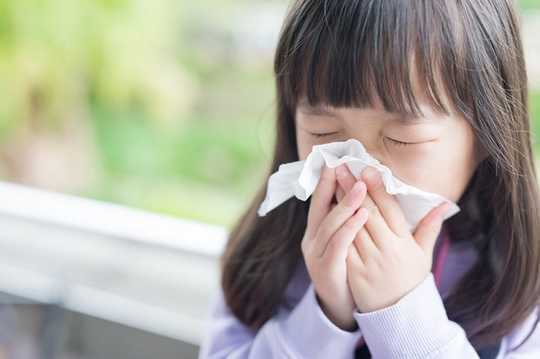
Despite risks and no clear benefits, doctors are increasingly likely to recommend antihistamines for children under the age of 12 who have a cold, according to a new study.
Antihistamines are widely used over-the-counter to treat various allergic conditions. They have have little known benefit for children with colds, however, and some older antihistamines (e.g., diphenhydramine or Benadryl) cause sedation and occasionally agitation in children.
The study, which appears in JAMA Pediatrics, finds a sharp decline in cough and cold medicine recommendations for children under 2 after 2008, when the Food and Drug Administration recommended against the medicines for that age group due to safety concerns and uncertain benefits. The American Academy of Pediatrics subsequently recommended avoiding cough and cold medicines in children under 6.
“Families often treat their children’s respiratory infections with cough and cold medicines, some of which include opioid ingredients, such as codeine or hydrocodone. However, there is little proof that these medications effectively ease the symptoms in young children,” says lead author Daniel Horton, assistant professor of pediatrics, Rutgers Robert Wood Johnson Medical School.
“Also, many cough and cold medicines have multiple ingredients, which increases the chance of serious accidental overdose when combined with another product.”
The researchers looked at national surveys representing 3.1 billion pediatric ambulatory clinic and emergency department visits in the United States from 2002 to 2015. During that period, physicians ordered approximately 95.7 million cough and cold medications, 12 percent of which contained opioids.
After the FDA’s 2008 public health advisory, however, physician recommendations declined by 56% for non-opioid cough and cold medicines in children under 2 and by 68% for opioid-containing medicines in children under 6. At the same time, researchers saw a 25% increase in doctor recommendations for antihistamines to treat respiratory infections in children under 12.
“Sedating antihistamines such as diphenhydramine [Benadryl] may have a small effect on some cold symptoms in adults,” Horton says. “However, there is little evidence that antihistamines actually help children with colds feel better or recover faster. We do know that these medicines can make kids sleepy and some kids quite hyper.”
“It is nice to see physicians are heeding the advice to avoid cough and cold medications for children, but switching them to antihistamines is not necessarily an improvement,” says coauthor Brian Strom, chancellor, Rutgers Biomedical and Health Sciences.
The American Academy of Pediatrics has various suggestions for treating children with the cold or flu, including use of over-the-counter medicines for pain or fever, honey to relieve cough in children who are over 1 year old, and plenty of rest and hydration.
Source: Rutgers University
Related Books:
The Body Keeps the Score: Brain Mind and Body in the Healing of Trauma
by Bessel van der Kolk
This book explores the connections between trauma and physical and mental health, offering insights and strategies for healing and recovery.
Click for more info or to order
Breath: The New Science of a Lost Art
by James Nestor
This book explores the science and practice of breathing, offering insights and techniques for improving physical and mental health.
Click for more info or to order
The Plant Paradox: The Hidden Dangers in "Healthy" Foods That Cause Disease and Weight Gain
by Steven R. Gundry
This book explores the links between diet, health, and disease, offering insights and strategies for improving overall health and wellness.
Click for more info or to order
The Immunity Code: The New Paradigm for Real Health and Radical Anti-Aging
by Joel Greene
This book offers a new perspective on health and immunity, drawing on principles of epigenetics and offering insights and strategies for optimizing health and aging.
Click for more info or to order
The Complete Guide to Fasting: Heal Your Body Through Intermittent, Alternate-Day, and Extended Fasting
by Dr. Jason Fung and Jimmy Moore
This book explores the science and practice of fasting offering insights and strategies for improving overall health and wellness.




























